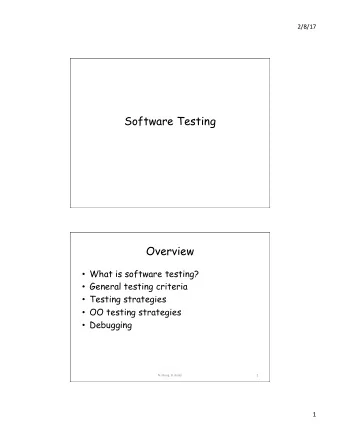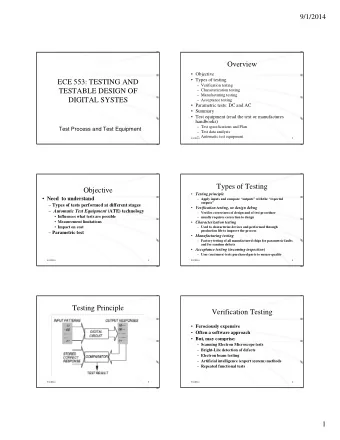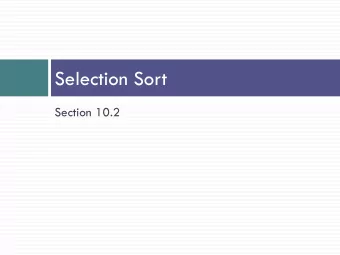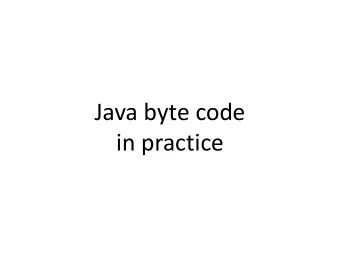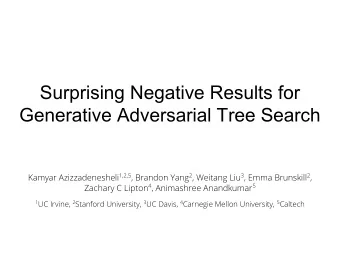
Sustainable way of testing your code by Eugene Amirov Teamlead at - PowerPoint PPT Presentation
Sustainable way of testing your code by Eugene Amirov Teamlead at Scrapinghub For top 100 most starred Python projects on GitHub the percentage of testing code is a little bit more that 23%. Percentage of tests Lines of code in tests def
Sustainable way of testing your code by Eugene Amirov Teamlead at Scrapinghub
For top 100 most starred Python projects on GitHub the percentage of testing code is a little bit more that 23%.
Percentage of tests
Lines of code in tests
def test_adding_same_dsn_multiple_times(self): logger = Mock() logger.handlers = [] logger.addHandler = Mock(wraps=self.logger.handlers.append) dsn = 'http://user:pass@test/1' handler1 = register_sentry_logging(dsn, logger) self.assertIn(handler1, logger.handlers) handler2 = register_sentry_logging(dsn, logger) self.assertIsNone(handler2) self.assertEqual(len(logger.handlers), 1)
Initial condition : We have some prepared environment which we know to be true
Initial condition : We have some prepared environment which we know to be true The event : In this environment we execute some action that we want to test
Initial condition : We have some prepared environment which we know to be true The event : In this environment we execute some action that we want to test Expected outcome : We expect some particular results of this action
Given a customer previously bought a black sweater from me And I currently have three black sweaters left in stock When he returns the sweater for a refund Then I should have four black sweaters in stock
def test_adding_same_dsn_multiple_times(self): logger = Mock() logger.handlers = [] logger.addHandler = Mock(wraps=self.logger.handlers.append) dsn = 'http://user:pass@test/1' handler1 = register_sentry_logging(dsn, logger) self.assertIn(handler1, logger.handlers) handler2 = register_sentry_logging(dsn, logger) self.assertIsNone(handler2) self.assertEqual(len(logger.handlers), 1)
environment def test_adding_same_dsn_multiple_times(self): - logger = Mock() - logger.handlers = [] - logger.addHandler = Mock(wraps=logger.handlers.append) + self.given_logger() dsn = 'http://user:pass@test/1' handler1 = register_sentry_logging(dsn, logger) self.assertIn(handler1, logger.handlers) handler2 = register_sentry_logging(dsn, logger) self.assertIsNone(handler2) self.assertEqual(len(logger.handlers), 1)
action def test_adding_same_dsn_multiple_times(self): self.given_logger() - dsn = 'http://user:pass@test/1' - - handler1 = register_sentry_logging(dsn, logger) + self.when_handler_is_registered('http://user:pass@test/1') self.assertIn(handler1, logger.handlers) - handler2 = register_sentry_logging(dsn, logger) + self.when_handler_is_registered('http://user:pass@test/1') self.assertIsNone(handler2) self.assertEqual(len(logger.handlers), 1)
expectation def test_adding_same_dsn_multiple_times(self): self.given_logger() self.when_handler_is_registered('http://user:pass@test/1') - self.assertIn(handler1, logger.handlers) + self.then_sentry_dsn_is_registered('http://user:pass@test/1') self.when_handler_is_registered('http://user:pass@test/1') - self.assertIsNone(handler2) - - self.assertEqual(len(logger.handlers), 1) + self.then_n_sentry_handlers_registered(1)
def test_adding_same_dsn_multiple_times(self): self.given_logger() self.when_handler_is_registered('http://user:pass@test/1') self.then_sentry_dsn_is_registered('http://user:pass@test/1') self.when_handler_is_registered('http://user:pass@test/1') self.then_n_sentry_handlers_registered(1)
def test_sentry_logging_handler(self): self.given_logger() self.when_handler_registered('http://user:pass@test/1') self.then_sentry_dsn_is_registered('http://user:pass@test/1') self.then_n_sentry_handlers_registered(1) def test_adding_same_dsn_multiple_times(self): self.given_logger() self.given_handler_registered('http://user:pass@test/1') self.when_handler_is_registered('http://user:pass@test/1') self.then_sentry_dsn_is_registered('http://user:pass@test/1') self.then_n_sentry_handlers_registered(1)
def test_sentry_logging_handler(self): self.given_logger() self.when_handler_registered('http://user:pass@test/1') self.then_sentry_dsn_is_registered('http://user:pass@test/1') - self.then_n_sentry_handlers_registered(1) + self.then_sentry_handlers_are_unique() def test_adding_same_dsn_multiple_times(self): self.given_logger() self.given_handler_registered('http://user:pass@test/1') self.when_handler_is_registered('http://user:pass@test/1') self.then_sentry_dsn_is_registered('http://user:pass@test/1') - self.then_n_sentry_handlers_registered(1) + self.then_sentry_handlers_are_unique()
+ def setUp(self): + super().setUp() + self.given_logger() def test_sentry_logging_handler(self): - self.given_logger() self.when_handler_registered('http://user:pass@test/1') self.then_sentry_dsn_is_registered('http://user:pass@test/1') self.then_sentry_handlers_are_unique() def test_adding_same_dsn_multiple_times(self): - self.given_logger() self.given_handler_registered('http://user:pass@test/1') self.when_handler_is_registered('http://user:pass@test/1') self.then_sentry_dsn_is_registered('http://user:pass@test/1') self.then_sentry_handlers_are_unique()
class Aquarium(object): ... def is_habitable_by(self, fish): ... class MarineAquarium(Aquarium): ... class FreshwaterAquarium(Aquarium): ... class DutchAquarium(FreshwaterAquarium): ...
def test_habitability(self): self.given_aquarium(FreshwaterAquarium) self.when_checking_habitability_for(Guppi) self.then_aquarium_is_habitable() self.when_checking_habitability_for(Rasbora) self.then_aquarium_is_habitable() self.when_checking_habitability_for(Goldfish) self.then_aquarium_is_habitable() self.when_checking_habitability_for(Leopoldi) self.then_aquarium_is_habitable()
def test_habitability(self): self.given_aquarium(FreshwaterAquarium) for fish in Guppi, Rasbora, Goldfish, Leopoldi: self.when_checking_habitability_for(fish) self.then_aquarium_is_habitable()
def test_habitability(self): self.given_aquarium(FreshwaterAquarium) for fish in Guppi, Rasbora, Goldfish, Leopoldi: self.when_checking_habitability_for(fish) self.then_aquarium_is_habitable() def test_habitability(self): for fish in Guppi, Rasbora, Goldfish, Leopoldi: self._test_habitability(fish) def _test_habitability(self, fish): self.given_aquarium(FreshwaterAquarium) self.when_checking_habitability_for(fish) self.then_aquarium_is_habitable()
from nose_parameterized import parameterized, param ... class TestFreshwaterAquarium(BaseTestCase): @parameterized.expand([ param(Guppi), param(Rasbora), param(Goldfish), param(Leopoldi), ]) def test_habitability(self, fish): self.given_aquarium(FreshwaterAquarium) self.when_checking_habitability_for(fish) self.then_aquarium_is_habitable()
from nose_parameterized import parameterized, param ... class TestFreshwaterAquarium(BaseTestCase): @parameterized.expand([ param(Guppi), param(Rasbora), param(Goldfish), param(Leopoldi), ]) def test_habitability(self, fish): self.given_aquarium(FreshwaterAquarium) self.when_checking_habitability_for(fish) self.then_aquarium_is_habitable() class TestDutchAquarium(TestFreshwaterAquarium): @parameterized.expand([ param(Guppi), param(Gourami), param(Goldfish), ]) def test_habitability(self, fish): self.given_aquarium(FreshwaterAquarium) self.when_checking_habitability_for(fish) self.then_aquarium_is_habitable()
$ python -m unittest -v test.py test_habitability_0 (TestFreshwaterAquarium, guppi) ... ok test_habitability_1 (TestFreshwaterAquarium, rasbora) ... ok test_habitability_2 (TestFreshwaterAquarium, goldfish) ... ok test_habitability_3 (TestFreshwaterAquarium, leopoldi) ... ok test_habitability_0 (TestDutchAquarium, guppi) ... ok test_habitability_1 (TestDutchAquarium, gourami) ... ok test_habitability_2 (TestDutchAquarium, goldfish) ... ok test_habitability_3 (TestDutchAquarium, leopoldi) ... FAIL
Goals Parameterized tests
Goals Parameterized tests Inherited tests data
Goals Parameterized tests Inherited tests data No test repetition
Goals Parameterized tests Inherited tests data No test repetition Controlled execution
Requirements Apply one test method to many data Access to parent class Exclude data
Tools / approaches
decorator
decorator def new_function(*args, **kwargs): ... result = original_function(*args, **kwargs) ... return result
decorator def new_function(*args, **kwargs): ... result = original_function(*args, **kwargs) ... return result original function -> anything
decorator def new_function(*args, **kwargs): ... result = original_function(*args, **kwargs) ... return result original function -> anything original class -> anything
@parameterize_test_case class SomeTestCase(unittest.TestCase): ... @parameterize_test(... data ...) def test_something(self, param1, param2, ...) ...
@parameterize_test_case class SomeTestCase(unittest.TestCase): ... @parameterize_test(... data ...) def test_something(self, param1, param2, ...) ... @parameterize_test_case class SomeTestCase(unittest.TestCase): ... @parameterize_test(... data ...) def test_something(self, param1, param2, ...) ...
metaclass
metaclass class metacls(type): def __new__(mcs, name, bases, dict): dict.update(...) return type.__new__(mcs, name, bases, dict) (name, bases, namespace) -> class
Recommend
More recommend
Explore More Topics
Stay informed with curated content and fresh updates.



